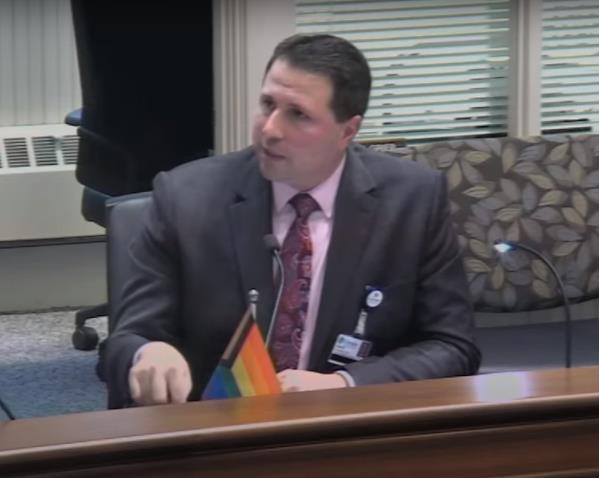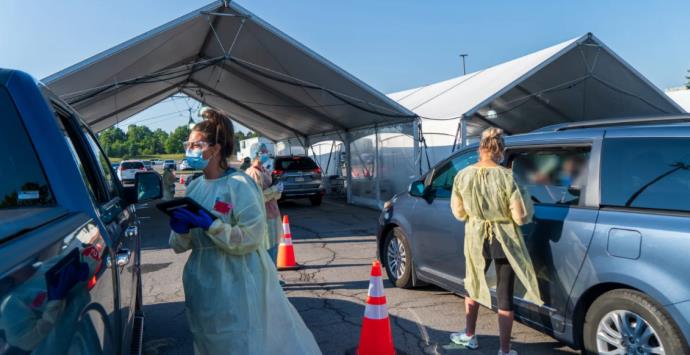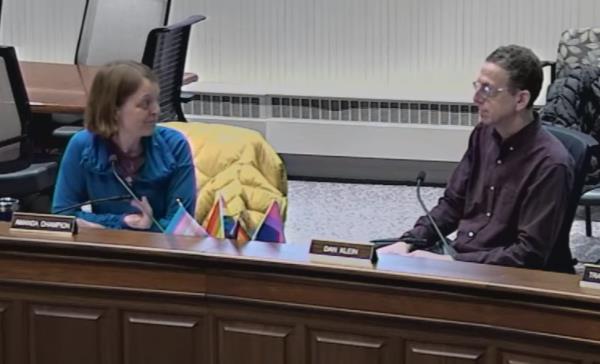Sampling Site to stay put as Tompkins subsidies end
CMC Exec claims testing efforts saved 181 Lives
by Robert Lynch, February 22, 2023; expanded reporting February 23, 2023
Despite a momentary scare blamed on a CEO’s inadvertent twist of the tongue, Cayuga Medical Center made clear Wednesday it has no plans to shutter its much-heralded and heavily-used COVID-19 Sampling Site at the Shops at Ithaca Mall in Lansing. The testing Site’s operation will continue despite declining numbers of patient samples drawn and the ending of Tompkins County Government’s subsidy to the facility.

Talk of the sampling site’s future emerged as Cayuga Health Systems’ President, Martin Stallone, praised the three-year old sampling effort and his hospital’s role in it to the Tompkins County Legislature’s Health and Human Services Committee.
“We were several times more tested and had a several times lower positive rate than the next highest county,” Stallone said, the executive blanketing the committee with comparative statistics and a step-by-step timeline chronicling how Cayuga Health’s local sampling effort began in March 2020 and wound to the present three years later.
Though Tompkins County financial support for the mall-based sampling center ended in December, Stallone did not at Wednesday’s meeting ask County lawmakers for any more money. And neither did committee members raise that possibility.
Rather, the direction of Stallone’s half-hour briefing became one of COVID viewed through the rear-view mirror. He reported Cayuga Health performed more than 2.7 Million COVID-19 tests during the nearly three-year period. 279,000 of those samples were drawn at the Lansing mall’s drive-through site. Many more were performed on college campuses. Tompkins County funded the cost of more than 75,000 of the tests.
“Those funds that came through those tests paid for more than simply the test,” Stallone explained, the administrator revealing, now in hindsight, the rather fungible nature of Tompkins County’s subsidies. County funds paid, he said, for “the development of the test. It paid for the drive-through. It paid for a lot of the vaccination efforts that we undertook.”
Tompkins County began subsidizing the CMC testing program in August 2020; five months after the pandemic began. The Legislature initially transferred $300,000 from its Contingent Fund to the testing program for what started as a 10-week trial run. The subsidy enabled local residents without qualifying insurance to obtain COVID-19 tests free of charge, thereby avoiding trips to state facilities in distant cities.
Over time, the federal government assumed a sizable, nearly total, share of the cost. Yet periodic local appropriations still proved necessary. Tompkins County made its last recorded draw from the Contingent Fund, $200,000, in June of last year. In July, Washington scaled back its subsidies, and Tompkins County ended its own contributions at year’s end.
The lack of governmental support, coupled with the declining numbers of patients requiring the tests, had raised the prospect that CMC might scale back its efforts, or perhaps even close its mall-based facility altogether. During a conference call with municipal officials February 2, County Administrator Lisa Holmes said she was not aware of what CMC planned to do.
In his presentation to the legislative committee Wednesday, CMC executive Stallone maintained that the testing program has returned quantifiable rewards not only in community health, but also in economic resiliency.
“A positive test is a positive test,” Stallone conceded. “But what it (the testing program) really did was equip a public health response that allowed those individuals to confidently isolate or confidently not isolate. And so they allowed our economy to continue to run.”
The statistics most likely to break out from Stallone’s half-hour legislative briefing remain figures one must accept with a degree of caution and the clear recognition that Tompkins County stands in a place far apart from the rest of this state because of the overwhelming dominance of college students.
The CMC-collected figures showed Tompkins County with the highest COVID testing rate in the state and the lowest per capita percentage of COVID-19 deaths. The data showed that, on average, a Tompkins County resident was tested for the disease more than 29 times, and that the positivity rate of those tested was only 0.87 per cent, far below the statewide average.
“The cumulative positive rate was the lowest,” Stallone said, “because we did more surveillance testing than anyone else.”
But CMC cannot take all of the credit. Recall that for most of the period, Cornell demanded its students—many of them healthy students—get tested for the disease, sometimes weekly.

And our county’s low mortality rate—only 100 persons died in a county of 105,000 (0.095 per cent)—also deserves clarification. Yes, testing matters. But so, too, does Tompkins County’s high vaccination rate, its residents’ masking compliance, and the fact that so many of us here are so young.
Comparing Tompkins County’s COVID mortality rate to the statewide average led Stallone to claim that local efforts saved nearly 200 lives that would otherwise have been lost.
“If our COVID mortality was average, we would have lost 181 more people than we did based on our population,” Stallone told the committee. “So I think that’s something that I think this body should take credit for.”
“This is an example of where investments were made and lives were saved because of that investment,” the hospital CEO asserted.
But did age matter? Newfield legislator Randy Brown asked the question.
“So you do generally have a younger, healthier population,” the hospital chief conceded. “But I don’t think that accounts for everything.”
Martin Stallone advised the committee—albeit erroneously—that college undergraduates generally don’t count in Tompkins County’s population totals, except, he said, when they live locally or attend graduate study. That may have been true when Dr. Stallone, as he recalled, resided as a student in Cornell’s Clara Dickson Hall. But the census now counts undergrads as local residents in its totals.
Martin Stallone made a second error. And when he did it briefly led any observer (including this writer) to infer that the mall-based sampling will imminently close; or for that matter, that CMC had already shuttered it surreptitiously.
At the end of his presentation, with his PowerPoint slide indicating progress made in February 2023, Stallone stated, “We actually closed the COVID testing at the mall with the (testing) totals that I listed before, 2.77 million tests.”
This writer dutifully reported the CEO’s words, inferring probable closure, only to retract that implication later Wednesday afternoon after the hospital corporation’s Vice President of Marketing and Communications clarified.
“If I said it incorrectly, I apologize,” Melissa Tourtellotte conveyed her boss’s correction and contrition. “What Stallone meant to say,” Tourtellotte rephrased, was that the analysis of sampling results—not the sampling itself—is being transferred from a Cayuga Medical site on Brown Road, its “Innovation Lab,” to CMC’s hospital on West Hill.
“It will be an invisible change to the public,” Tourtellotte said. She indicated that sampling for COVID-19 will remain in place at the mall for the indefinite future.
Tourtellotte’s reassurance ended two hours of journalistic bewilderment arising from the fact that the site’s potential closure didn’t square with information posted on the CMC website. And staff at the sampling center’s registration call center knew nothing about any locational change.
In the County Legislature’s chambers, committee members never acknowledged the administrators gaffe, nor reacted to the potential news. Instead, they showered CMC with praise for its accomplishments.
Tompkins County’s COVID response and its vaccination effort was “kind of thrilling on top of this terrible thing that was going on,” Health and Human Services Committee Dan Klein offered as a rather odd kind of compliment for a pandemic response.

“People have used the word ‘hero’ when it comes to the pandemic,” committee member Amanda Champion remarked. “And as you were describing it,” Champion told Stallone, “I thought, like, my gosh, there were people in these labs like actually doing the work, like that’s so amazing. And I’m so grateful that our county was supportive of that.”
What lessons were learned, Randy Brown asked.
“We certainly have lubricated our agility joints,” Martin Stallone responded. “We have practice in thinking out of the box and being bold.”
“You’re always fighting the last war,” Stallone acknowledged. “So the most challenging public challenge is the one we’re not expecting. I think if COVID happened again, we’d do very well. I hope we would do as well with a novel threat that we haven’t experienced yet.”
###

